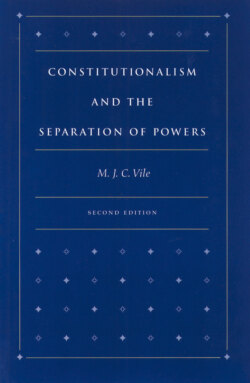Constitutionalism and the Separation of Powers

Реклама. ООО «ЛитРес», ИНН: 7719571260.
Оглавление
M. J. C. Vile. Constitutionalism and the Separation of Powers
Отрывок из книги
AND THE
SEPARATION OF POWERS
.....
The “separation of agencies,” therefore, is an essential element in a theory which assumes that the government must be checked internally by the creation of autonomous centres of power that will develop an institutional interest. Without the other elements of the doctrine of the separation of powers being present we might still expect some limitation on the ability of a single group to dominate the government if separate agencies are established. Even if the personnel of the agencies overlap, powerful influences may arise to create divergences of interest within the government. Differing procedures introduce differing values and different restraints; the emergence of an “institutional interest,” the development of professionalism, the influence of colleagues and traditions, all provide the possibility, at least, of internal checks. Separate agencies, composed of distinct bodies of men even where functions are shared can be made representative of different groups in the community, and so, as with bicameral legislatures, provide the basis of a check upon the activities of each of them.
The second element in the doctrine is the assertion that there are three specific “functions” of government. Unlike the first element, which recommends that there should be three branches of government, this second part of the doctrine asserts a sociological truth or “law,” that there are in all governmental situations three necessary functions to be performed, whether or not they are in fact all performed by one person or group, or whether there is a division of these functions among two or more agencies of government. All government acts, it is claimed, can be classified as an exercise of the legislative, executive, or judicial functions. The recommendation then follows that each of these functions should be entrusted solely to the appropriate, or “proper,” branch of the government. This view of the “functions” of government is extremely abstract, and some of the attempts to justify this threefold division have reached a very high degree of abstraction indeed. It must be distinguished from the very different view of the functions of government which enumerates them as, for example, the duty of keeping the peace, of building roads, or of providing for defence. These we might label the “tasks” of government in order to distinguish them from the more abstract notion of function. In the period before Locke and Montesquieu firmly established this abstract view of the functions of government there were two main streams of thought, in one of which the word “power” was used to describe the function of legislating, or executing the law, and in the other a more practical view was taken of the multiplicity of government acts by dividing up the “attributes of sovereignty” into six, seven, or more categories, which included, as well as making laws, such tasks as the control of the coinage, or the appointment of standard weights and measures.8 The triumph of the more abstract conception of the “powers” or functions of government in the eighteenth century, and its later development and ramification, was of great importance for the way in which later writers approached the problems of government structure. In the twentieth century this view of the nature of the functions of government has been subjected to severely critical analysis, but the vocabulary of the doctrine still dominates our everyday usage and our way of thinking about the nature of the operations of government.
.....